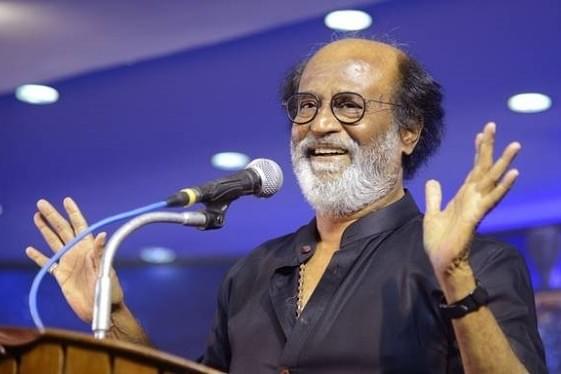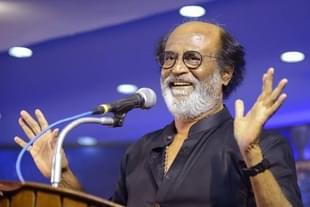Politics
Kaala: Rajinikanth Has No Political Message To Offer But As An Actor He Continues To Reinvent Himself
M R Subramani
Jun 16, 2018, 09:21 PM | Updated 09:21 PM IST
Save & read from anywhere!
Bookmark stories for easy access on any device or the Swarajya app.


One of the most awaited events this week was the release of the Tamil film Kaala, starring superstar Rajinikanth. In ordinary circumstances, people would have only discussed if the movie was worth watching and possibly how many times. But this time around, there is a different context to the release of the film.
Kaala has come after a couple of important and interesting developments in Tamil Nadu. First, Rajinikanth announced his entry into politics – claiming to offer spiritual politics. Second, it has been released after the state witnessed quite a few protests – opposition to the Methane project in the Cauvery Delta, protest against Neutrino Observatory near Theni, demand for Tamil Nadu’s share in Cauvery water, and violent incidents, including protests demaning the closure of Vedanta’s Sterlite copper plant in Thoothukudi, leading to the death of 13 people.
This release also comes after the controversy over Rajinikanth’s visit to Thoothukudi, where be blamed anti-social elements for the violence. The actor had to face harsh criticism over his statement, especially with media and politicians twisting it. A section of his fan base make up the cadre of the Dravidian parties in Tamil Nadu, and may have felt bitter about his Thoothukudi statement. In addition, the movie has been released within days of schools reopening after summer holidays. Had this movie been released sometime in April or early May, the scenario would have been different. Second, Rajinikanth has again teamed up with director Pa Ranjith after they both delivered a sub-par Kabali. Not too many were enthused by their coming together again. These two factors have, probably, resulted in one of the weakest openings for a Rajinikanth movie in recent memory.
Not many were happy after seeing Kabali because it didn’t have Rajinikanth’s signature punch lines and style. That is one reason why some of his ardent fans weren’t enthused with his decision to partner with Ranjith again. Ranjith is a director who has made no bones of his intention that his films will have politics that he believes in – read politics of the downtrodden. His first film was Atta Kathi, about a youth’s love affairs in a slum. His second film, Madras, revolved around the politics of a wall in a North Madras slum and the dangers associated with it. In fact, it brought in a refreshing change and made people take notice of him. This, perhaps, made Rajinikanth to team up with him. But then, Ranjith loves to make films in his style, for him, his story matters and not any actor’s reputation. And this has remained the case even for his latest offering, Kaala.
Rajinikanth again doesn’t have any of his trademark punch lines in the film, but the superstar shows that he, too, is a director’s actor and has come out with flying colours. The story is all about a Tirunelveli family settling in the Mumbai slum Dharavi. Rajinikanth stars as Kaala or Karikalan, who is trying to protect his rights – his land against a powerful builder mafia led by Hari dada, neatly done by Nana Patekar. There is a lot of bloodshed, but in the end, the power of people triumphs.
Kaala is no Rajinikanth movie. It is Pa Ranjith’s movie from start to the end and his authoritative stamp can be seen all over. There are moments in this movie that remind you of some of the protests Tamil Nadu has seen, like the one demanding that the ban on jallikattu be removed in 2016 – the policeman expressing his support for the protestors – or even the latest protests against Sterlite. It shows a deep-rooted conspiracy of vested interests. It also throws light into how some youth, without realising the underlying danger, get sold to themes like development. Some would think that there is a subtle message against a clean India since we often hear “pure Mumbai” dialogue. But the director’s sole objective seems to be that land is people’s right. He feels it would be better to leave it that way and the government shouldn’t insist that power is its right.
There are parts in the movie where the political class is criticised. The director tells the white-clad politicians in at least two scenes through his lead actor that they cannot override the wishes of the people and, more importantly, their ‘whiteness’ make them think poorly of the working class. “The black colour signifies the worker,” says the hero in one of the highlights of the movie while meeting the villain in his den, adding that cleanliness and neatness are their masks. But then, there is no showmanship, no needless duets or even one-upmanship. In any other movie, he would have delivered punch lines or even beaten the villain to pulp, but not in this one. For a major part of the movie, the director has his foot firmly on the ground.
If you are looking for a message or punch lines from Rajinikanth, you are better off not going to watch this movie. But if you just want to see a good movie, then this wouldn’t be a bad choice. But then, you would wonder if there is anything in the movie that one can relate the superstar to politics.
Well, there are a couple of scenes that suggest the actor wishes to convey a message to the people of Tamil Nadu. First, in the scene in which he is introduced, Rajnikanth is playing cricket with some kids in the Dharavi slum, and needs to hit two runs for victory. He is playing when the rest of the slum is attempting to ward off the builders trying to demolish it. Rajnikanth is clean bowled by the kid, leaving him short of a victory and he asks his lieutenant, who is umpiring, to declare it a no ball. He probably is attempting to replay what happened during 1995-96 when his popularity was at a peak and he wanted assembly elections.
Second is when he takes on the builder mafia and the villian’s henchmen to say why he wouldn’t compromise with them to take over his people’s lands. Remember, he had come to Dharavi from Tirunelveli. When he says, “This is the land that I have grown up in. It has given me everything. I will not give this up,” he is, perhaps, referring to his land of Chennai to where he moved from Bangalore.
Third is where he says people need not be scared of anyone as they are the hard working class.
Kaala, probably, is telling people that the superstar is in a stage of transition, though he could be back as a stylistic hero in 2.0, a science fiction film by Shankar with Akshay Kumar as the villain. Shankar, Rajinikanth, and A R Rehman are a great combination that could draw a far better response with regard to bookings. Kumar’s presence will likely boost earnings in North India. Again, it will not signify anything with regard to Rajinikanth’s politics.
Kaala is a movie that asserts a man’s right to a land where he has lived and grown. Politically, Rajinikanth has indicated nothing to anyone in this film. Professionally, the superstar continues to reinvent himself.
Also Read: Kaala: Pa Ranjith Has Got Dharavi And Its Redevelopment Wrong
M.R. Subramani is Executive Editor, Swarajya. He tweets @mrsubramani





